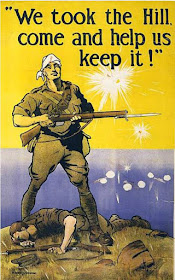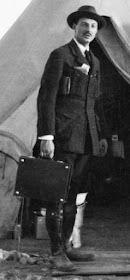This incredibly detailed sculpture of a Corona 3 portable typewriter is the work of Jane Estelle Bailey and Mark Andrew Snell of the Lavaworx Art Studio in Coolum, Queensland. The sculpture represents the typewriter used by Australia's official war correspondent and war historian Charles Bean when he covered the Gallipoli landings in 1915. The sculpture is part of the Gallipoli to Armistice Memorial in Maryborough, Queensland.
Bailey and Snell.
At a time when senseless mass killings seem to be part of our weekly life, Anzac Day will yet again be marked by many tens of thousands of New Zealanders and Australians tomorrow. Anzac Day has become much more than the simple, muted show of respect for the war dead that it was in my younger days; now it's an annual ritual which almost appears to macabrely celebrate the slaughter that occurred on the beaches of Turkey in 1915. On its fringes, it's a touchstone for espousing the worst kinds of nationalism.Indeed, the pilgrimage to Gallipoli has itself turned incendiary, with Turkish leader Recep Tayyip Erdoğan - in the aftermath of the Christchurch mosque murders - saying, “Your grandfathers came and saw that we're here. Then some of them walked back, while others left in coffins. If you come with the same intention, we'll be waiting for you."
A 1916 recruiting poster.
Erdoğan later, allegedly, backed away from that veiled threat, and about 700 Australians and 500 New Zealanders will attend dawn commemorations at Gallipoli. But, for me at least, it's not a healthy sign that Erdoğan's Government has barred Turks from attending. "Nothing is left to chance and keeping every Turkish person out eliminates a lot of risk," said an official. The Turkish military has imposed the lockdown after a huge security sweep.
A 1915 recruitment poster.
It's exceedingly sad that this has become a necessity. When, 104 years ago, Australian invaders on Turkish sovereign soil exchanged deadly gunfire with Turkish defenders, there was, oddly enough, still a small spark of humanity left. There was a truce on May 24 to collect and bury the bodies which carpeted no man's land, and as this image shows, Australian Diggers came to the aid of wounded Turks in the foothills of Achi Baba, the height dominating the Gallipoli Peninsula.
A 1915 H.J. Watson recruiting poster.
Many of these acts of compassion were written about by the typewriter-wielding journalists who covered the Gallipoli campaign, notably Charles Bean, his fellow Australian Phillip Schuler (who also used a Corona 3), and the Englishman Ellis Ashmead-Bartlett (Empire lightweight). But it was, in the main, these three men with their portable typewriters who created the enduring Anzac legend, a story of "glorious sacrifice" in the cause of British imperialism. As that same Britain now heads toward the self-imposed catastrophe of Brexit - rendering the nation a friendless orphan rather than a "mother" land - marking Anzac Day should perhaps be seen more and more as outdated, irrelevant and inconsequential. Or just plain silly. Strangely enough, however, quite the opposite is the case. Has our growing fascination with killing fields become so great we can't let go of Gallipoli? Are we now so imbued with mass murder that we need to continue to "celebrate" atrocities from more than a century ago? It would seem so. Certainly Anzac Day is being marked with increased passion as each year goes by.
Schuler at Mena Camp, Egypt, Christmas Eve 1914, with his Corona 3 in its case.
Charles Bean's photo of Schuler aboard the army transport the Orvieto
on his way to Egypt in October 1914.

 One of my former editors at The Canberra Times, Mark Baker, now in charge of the Melbourne Press Club, in 2016 published a biography of Schuler, Phillip Schuler: The Remarkable Life of one of Australia's Greater War Correspondents. Unfortunately, it is laced with typographical errors (why do writers waste space thanking editors who have so badly let them down?), but the book is nonetheless an interesting read, including as it does intimate details of Schuler’s two love affairs – and the child about which he knew nothing. His lovers were Mrs Nelly Rossi (above left) in Cairo and Mrs Polly Howard (above, right) in Victoria, Australia. Canberra writer and historian Kristen Alexander, in her Honest History review of Baker's book, felt that given this purported to be a biography of one man, far too much space was devoted to Schuler's fellow war correspondents. She said the book showed an "apparent bias against Keith Murdoch ... Murdoch and his Gallipoli letter [typed on a Corona 3] are savaged. The prejudice continues throughout, on occasion verging on the vindictive." Personally, I felt Baker's rancour toward Murdoch (father of Rupert Murdoch) was more than justified, but Alexander's review remains fair. Still, Murdoch's unreliable "Gallipoli letter" embellishments of Ashmead-Bartlett's criticism of the Gallipoli campaign merely fueled the notion that the Anzacs gave their homelands nationhood, at the cost of oceans of young Antipodean blood. Was it all worth it? In the long run, as Brexit nears, the answer is a most definite no. But history is what it must be, irreversible.
One of my former editors at The Canberra Times, Mark Baker, now in charge of the Melbourne Press Club, in 2016 published a biography of Schuler, Phillip Schuler: The Remarkable Life of one of Australia's Greater War Correspondents. Unfortunately, it is laced with typographical errors (why do writers waste space thanking editors who have so badly let them down?), but the book is nonetheless an interesting read, including as it does intimate details of Schuler’s two love affairs – and the child about which he knew nothing. His lovers were Mrs Nelly Rossi (above left) in Cairo and Mrs Polly Howard (above, right) in Victoria, Australia. Canberra writer and historian Kristen Alexander, in her Honest History review of Baker's book, felt that given this purported to be a biography of one man, far too much space was devoted to Schuler's fellow war correspondents. She said the book showed an "apparent bias against Keith Murdoch ... Murdoch and his Gallipoli letter [typed on a Corona 3] are savaged. The prejudice continues throughout, on occasion verging on the vindictive." Personally, I felt Baker's rancour toward Murdoch (father of Rupert Murdoch) was more than justified, but Alexander's review remains fair. Still, Murdoch's unreliable "Gallipoli letter" embellishments of Ashmead-Bartlett's criticism of the Gallipoli campaign merely fueled the notion that the Anzacs gave their homelands nationhood, at the cost of oceans of young Antipodean blood. Was it all worth it? In the long run, as Brexit nears, the answer is a most definite no. But history is what it must be, irreversible.
The Machiavellian and manipulating Keith Murdoch, right - a true inspiration for his son Rupert - with the then Australian Prime Minister, Welshman Billy Hughes, in France in World War I. Both used Corona 3 portable typewriters.
A letter from British Prime Minister Asquith shows what he thought of Murdoch. Nevertheless British military leader Ian Hamilton (below) was removed from the Gallipoli campaign.
Schuler, whose father Frederick (below) was editor of The Age newspaper in Melbourne, returned to Australia from Gallipoli but in 1916 enlisted as a solder and returned to the battlefield, serving on the Western Front. He was killed at the Battle of Messines in 1917, aged 28.
Schuler at a Cairo hotel.
Schuler in 1914, far right, with Charles Bean, second from left, Bean's father the Reverend Edwin Bean, far left, and Archie Whyte of The Sydney Morning Herald.


















If only memorials of war and battles would remain somber instead of celebrations and, like here in the USA, turned into just a day to have parties or turned into commercial ventures by big corporations.
ReplyDeleteBut what does Asquith mean by referring to the unreliable "antecedents" of Keith Murdoch? Isn't this a snobbish slur against the then-recent ancestors of nearly all white Australians?
ReplyDelete